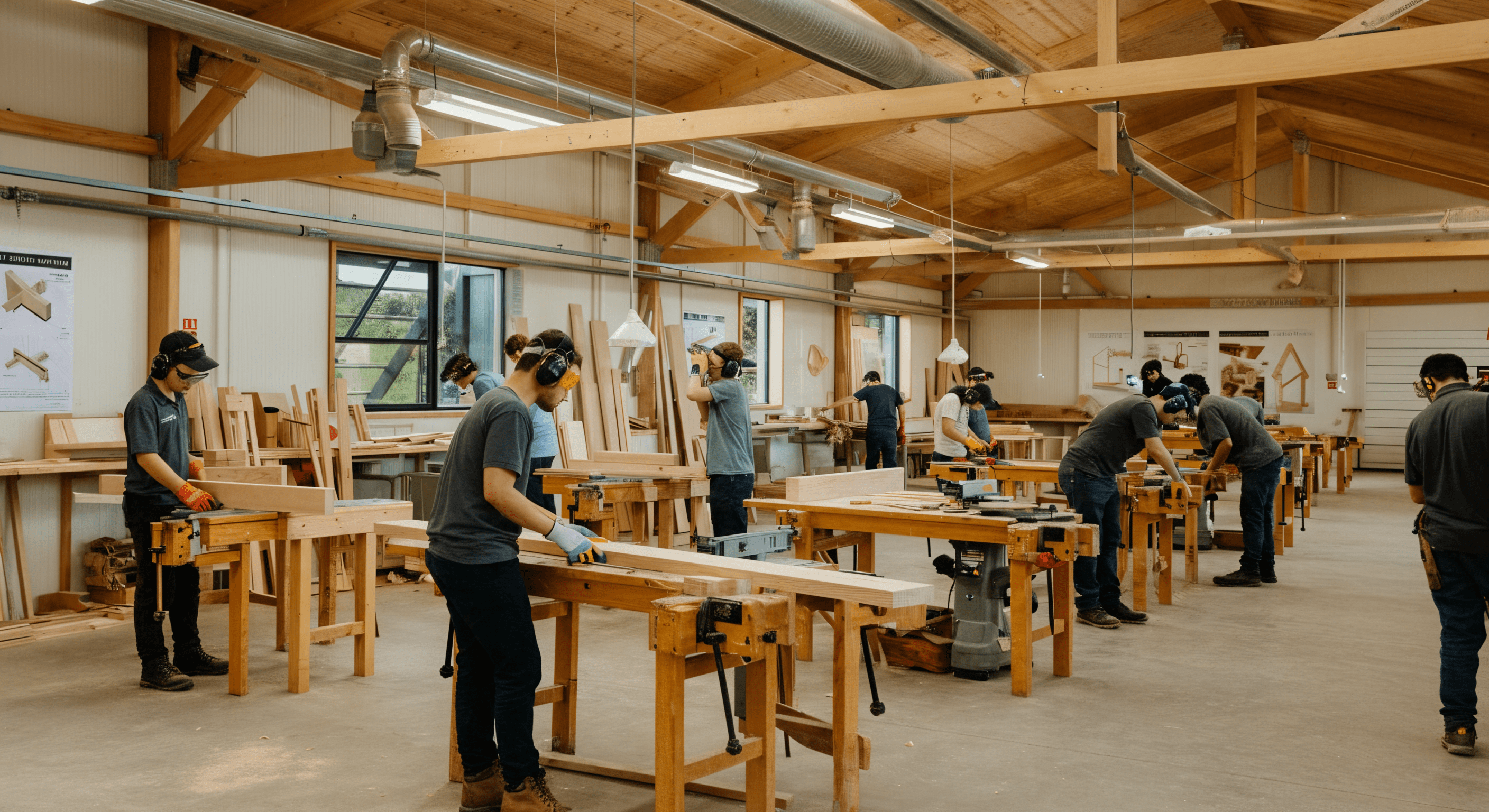Carpentry is a significant trade that combines craftsmanship with creativity and plays a crucial role in Australia’s construction and building industry. Aspiring carpenters can follow a structured educational pathway to equip them with the necessary skills and knowledge for a successful career. This pathway typically begins with secondary education, progresses through vocational training, and culminates in hands-on experience through formal apprenticeship programmes. These programmes, providing a wide range of courses from Certificate II in Construction Pathways to Certificate IV in Building and Construction, lay the groundwork and help prepare individuals for project management and specialised trades.
1. Certificate II in Building and Construction
- Duration: Typically 6 months to 2 years.
- Cost: Approximately AUD 1,000 to AUD 3,000, though this can vary depending on the institution and location.
- Credits: Generally around 10-15 units.
- Description: This entry-level course provides foundational skills in construction and prepares students for further study or an apprenticeship in carpentry.
Course Providers:
- Cost: The full tuition fee is approximately AUD 8,140.
- Details: This course introduces various trades within the building industry. Students develop a broad range of joinery, shopfitting, carpentry, and bricklaying skills alongside foundational skills for a trade apprenticeship.
- Cost: Concession rates and full fee details are available upon enquiry.
- Details: Combines theory and practical work, teaching students to:
-
- Workers should construct fundamental wall structures along with roof framework components.
-
- Use carpentry tools and equipment according to proper usage guidelines.
-
- Individuals must understand and correctly apply fundamental plans as well as drawings.
-
- Study the procedures for levelling buildings alongside sustainable construction principles.
-
- Builders must implement all safety protocols that exist in construction work.
Australian Trade Training College (ATTC)
- Cost: The regulated rate is AUD 1.60 per nominal hour for eligible apprentices; non-funded fees must be confirmed prior to training.
- Details: Completing this course will give students the skills to confidently seek an apprenticeship in construction occupations such as bricklaying, carpentry painting and decorating, and wall and floor tiling.
2.Certificate III in Carpentry (CPC30220)
Duration: 3 to 4 years (including apprenticeship).
Cost: Ranges from AUD 3,000 to AUD 10,000 depending on the provider and any additional fees.
Credits: Typically requires completion of around 24 units.
Description: Students progress through hands-on wall framing, roofing, and stair installation training. Emphasising practical learning, the program combines classroom theory with simulated work environments, preparing students for real-world carpentry jobs with advanced skills and confidence.
Course Providers:
- Duration: over 38 weeks, 3 days per week
- Cost: Approximately $21,824
- Description: Studying at Holmesglen provides a hands-on, practical learning experience tailored to industry needs. Students gain essential skills to succeed in their field through a blend of classroom theory and real-world applications. Holmesglen’s state-of-the-art facilities ensure students are fully equipped for the workforce. At the same time, regular trainer support and workplace assessments keep learning on track.
- Duration: 94 weeks.
- Cost: AUD 35,000.
- Details: This course is a trade qualification for carpenters in residential and commercial workplaces. It covers tasks such as setting out, manufacturing, constructing, assembling, installing, and repairing products made using timber and non-timber materials.
3.Certificate IV in Building and Construction (CPC40120)
This qualification is often pursued after completing Certificate III in Carpentry for those looking to advance their careers.
- Duration: Approximately 1 year full-time or part-time equivalent.
- Cost: Around AUD 3,000 to AUD 7,000.
- Credits: Usually requires completion of about 10 units.
- Description: This course is designed for those looking to advance their carpentry or construction management careers. It covers more complex aspects of building and project management.
Course Providers:
- Duration: 1 year full-time or part-time options
- Cost: The full fee is approximately AUD 12,000; government-subsidised rates are available.
- Details: The course covers finances, planning and estimating, contracts and schedules, legal requirements, OHS compliance, structural principles, and key aspects of managing a small business. Building Work Supervisors ensure that all building work performed meets the required building standards.
- Duration: 1 year part-time
- Cost: Approximately AUD 6,500 – AUD 8,000, depending on funding eligibility.
- Details: Focuses on business management skills for aspiring builders.
- Location: Victoria (with online options available)
- Cost: Approximately AUD 5,000 – AUD 12,000, depending on delivery mode and funding.
- Duration: 38 – 59 weeks part-time
- Details: Offers flexible learning options, including in-person and online classes.
- Website: Builders Academy
4.Online Carpentry Training Courses in Australia
Course Providers:
- Course Name: Online Carpentry Course
- Duration: Flexible; self-paced
- Cost: Contact for pricing (usually around AUD 1,000 – AUD 3,000)
- Credits: Not specified; focuses on practical skills development.
- Description: This carpentry training course covers essential carpentry techniques and knowledge suitable for beginners and those looking to refine their skills. It includes practical assignments and access to resources like video tutorials.
- Certification: Carpentry certification upon completion.
- Website: Learning Cloud
General Entry Requirements for Carpentry Apprenticeship Courses
- Certificate II in Building and Construction (Pre-apprenticeship)
- Educational Requirement: Completion of Year 10 or equivalent. Applicants without this qualification may provide additional information, such as a CV, to support their application.
- Age Requirement: Generally, applicants must be at least 15 years old.
- Additional Requirements: A White Card (Construction Induction Card) is recommended before starting work on construction sites.
- Certificate III in Carpentry (CPC30220)
- Educational Requirement: Completion of Year 10 or equivalent. This is essential for understanding technical instructions and performing calculations required in carpentry.
- Age Requirement: You must be at least 16 years old for standard apprenticeships; school-based apprenticeships can start at 15 years.
- Additional Requirements:
-
- Must be signed into an approved Training Contract with an employer.
-
- Basic literacy and numeracy skills are necessary; a White Card is required for construction site work.
- Certificate IV in Building and Construction
- Educational Requirement: Completion of Certificate III in Carpentry or equivalent experience in the building industry is often required.
- Age Requirement: Applicants must generally be at least 18 years old due to the nature of the responsibilities involved.
- Additional Requirements:
-
- Relevant work experience may be beneficial.
-
- A White Card is typically required for site work.
Career Pathway
Australian carpenter apprentices should finish their secondary education and join the Certificate III in Carpentry (CPC30220) program for around 3 to 4 years, where they must learn through practical workplace training and formal classroom studies. Then, after certification as a carpenter apprentice, students transition into practical carpentry work while also gaining the opportunity to study for either the Certificate IV in Building and Construction (CPC40120) or the Diploma of Building and Construction (CPC50220). Carpenters who progress professionally through their field can attain positions like journeyman carpenter, site supervisor, project manager and even start their businesses.
Completing carpentry training courses in Australia opens opportunities for those eager to enter the construction industry. These programmes provide the technical knowledge and practical experience needed to excel, ensuring that graduates are well-prepared for the demands of the trade. As the construction sector grows, skilled carpenters remain in high demand, making these educational pathways a wise choice and a gateway to a rewarding and sustainable career. Investing in education today lays the foundation for success in the building landscape of tomorrow.




